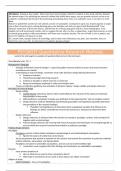Class notes
PSY3007S: Quantitative Section (Lecture and Textbook Content Summaries)
- Course
- Institution
- Book
This study document covers all the content needed for the PSY3007S Psychometrics section. It has content from lecture slides, explanations from lecturers, summaries of readings, as well as helpful comparison tables and summaries of content to aid studying. The document is well organised to help mak...
[Show more]



